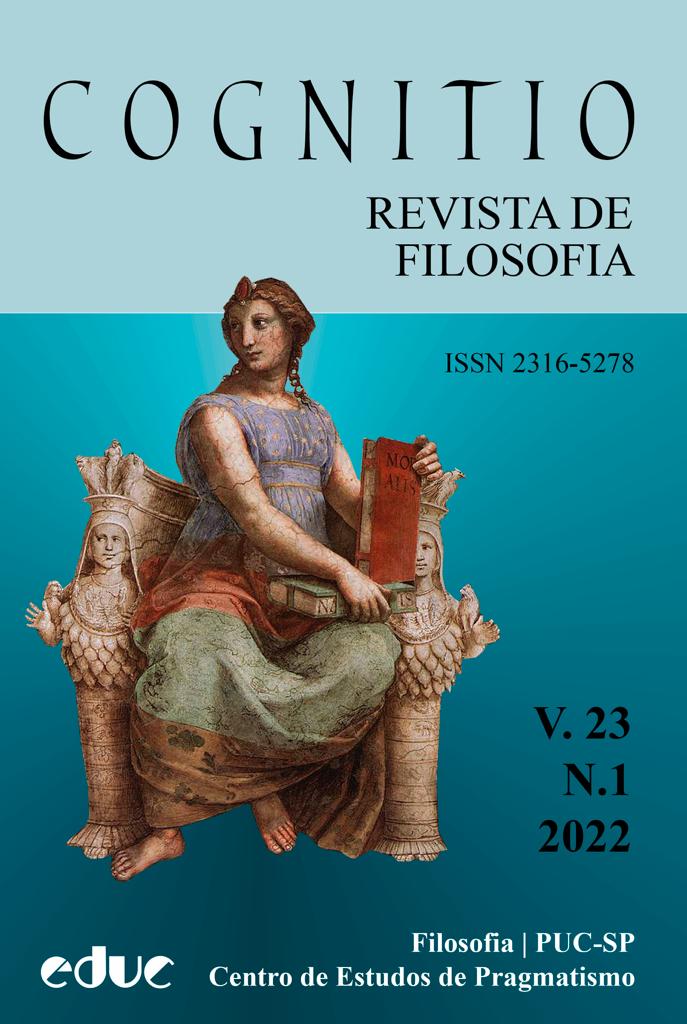Superextensão, assertabilidade modal e discernibilidade hipotética
a teoria de Bertrand Russell sobre o conteúdo de estratégias especulativas e sua compatibilidade com uma solução coerentista
DOI:
https://doi.org/10.23925/2316-5278.2022v23i1:e58724Resumo
Argumentamos que o tratamento de Russell de proposições contendo denotações inexistentes é o prelúdio de uma estratégia para discernir o conteúdo preditivo de qualquer proposição com descrições (e símbolos incompletos), na medida em que sua indeterminação é classificável como uma extensão possível. Argumentamos, ainda, que a teoria das funções proposicionais de Russell se dedica a explicar a discernibilidade de proposições hipotéticas, por meio da representação (o que chamamos) da superextensão de proposições modais assertóricas. A indeterminação da verdade de proposições hipotéticas é, assim, emparelhada com uma condição de classificação de segunda ordem, expressando seu conteúdo conjectural como o escopo projetado de instanciação de umafunção proposicional; que por sua vez é a superextensão de um predicado modal. A teoria de Russell é sua resposta não pragmática ao problema da assertabilidade em condições instáveis e incertas. Trata-se de uma tese sofisticada sobre a discernibilidade de conteúdos complexos, como aqueles representados por denotações analógicas e aproximadas (descrições, ficções etc.), que classificam mais de uma possibilidade de instanciação em diferentes contextos modais e intensionais. Concluiremos este artigo testando o pressuposto de que a teoria de Russell favorece uma teoria coerentista, visto que admite condições de assertibilidade que são supermapeadas em um sistema, ou que derivam de diferentes ordens de camadas referenciais.
Referências
DAVIDSON, Donald. Inquiries into Truth and Interpretation. Oxford: Clarendon Press, 2001. KROON, Frederick. Descriptivism, Pretense, and the Frege-Russell Problems. The Philosophical
Review, v. 113, n. 1, p. 1-30, jan. 2004.
MAUDLIN, Tim. Truth and Paradox: Solving the Riddles. Oxford: Clarendon Press, 2004.
RUSSELL, Bertrand. An Inquiry Into Meaning and Truth. Great Britain: Unwin Brothers Limited Woking, 1940.
RUSSELL, Bertrand. On Denoting. Mind: New Series, v. 14, n. 56, p. 479- 493, oct. 1905.
RUSSELL, B. The Philosophy of Logical Atomism. In. The Collected Papers of Bertrand Russell. Volume 8: The Philosophy of Logical Atomism and Other Essays, 1914-1919. SLATER, John (ed.). London: Routledge, 1918.
RYLE, Gilbert. Induction and Hypothesis. In: Collected Papers. Vol. 2. London & New York: Rout- ledge, 2009, p. 137-60.
SOAMES, Scott. Reference and Description: The Case Against Two-Dimensionalism. Princeton: Princeton University Press, 2005.
STRAWSON, Peter. On Referring. Mind., n. 59, p. 320-344; reprinted in Strawson 1971, 2005. WITTGENSTEIN, Ludwig. Tractatus logico-philosophicus. London: Kegan Paul; Trench; Trub-
ner, 1922.
WRIGHT, Crispin. Realism, Meaning, and Truth. Cambridge Massachusetts, Blackwell, 1993.
Downloads
Publicado
Como Citar
Edição
Seção
Licença
Copyright (c) 2022 http://creativecommons.org/licenses/by/4.0/

Este trabalho está licenciado sob uma licença Creative Commons Attribution 4.0 International License.









